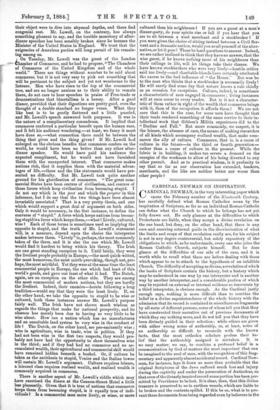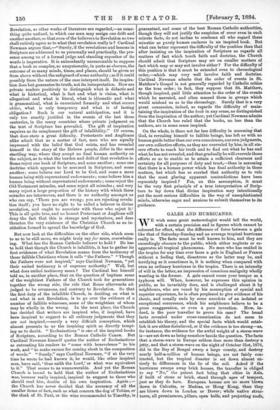CARDINAL NEWMAN ON INSPIRATION.
CARDINAL NEWMA.N, in the very interesting paper which opens the February number of the Nineteenth Century, has carefully defined what Roman Catholics mean by the inspiration of Scripture, so far as an individual Roman Catholic can define what the Church to which he belongs has not yet fully drawn out. He only glances at the difficulties to which Protestants are liable, when they accept a divine revelation on the one hand, but deny, on the other hand, that there is any sure and unerring external guide in the discrimination of what the limits and scope of that revelation really are, for his subject is not in any degree controversial, but solely expository of the obligations to which, as he understands, every one who joins the Roman Catholic Church, subjects himself. But he does glance at the difficulties of our side of the case, and it is worth while to recall what these are before dealing with those which appear to us to attach to the hypothesis of an infallible Church. The difficulty of accepting as divine, a revelation of which the books of Scripture contain the history, but a history which may be understood in one way by one interpreter and in another way by another interpreter, and a considerable portion of which may be rejected on external or internal evidence as inaccurate by a third interpreter, is obvious enough. As the Cardinal justly enough says, nothing is more difficult than to combine the belief in a divine superintendence of the whole history with the admission that its record is contained in miscellaneous fragments by all sorts of different persons, some of whom tell you that they have constructed their narrative out of previous documents of which they say nothing more, and do not tell you that they have been divinely guided in their selection ; while others are given with either wrong notes of authorship, or, at least, notes of an authorship so difficult to reconcile with the known facts, that the most orthodox scholars profess their be- lief that the authorship assigned is mistaken. It is no easy matter, we say, to combine a profound belief in a. .communication by God of matters the most important that can be imagined to the soul of man, with the recognition of this frag- mentary and apparently almost accidental record. Cardinal New- man, for instance, lays it down as more than probable that the original Scriptures of the Jews suffered much loss and injury during the captivity and under the persecution of Antiochne, so that even of the divinely inspired record some portion has been per- mitted by Providence to be lost. It is clear, then, that this divine treasure is preserved to us in earthen vessels, which are liable to be broken and the contents spilled. If this be so, what is to pre- vent these documents from being regarded even by believers in the Revelation, as other works of literature are regarded,—as some- thing quite unfixed, to which one man may assign one drift and another another; so that even of the believers in Revelation no two shall entirely agree as to what that revelation really is P Cardinal Newman argues that,—" Surely, if the revelations and lessons in Scripture are addressed to us personally and practically, the pre- sence among us of a formal judge and standing expositor of its words is imperative. It is antecedently unreasonable to suppose that a book so complex, so unsystematic, in parts so obscure, the outcome of so many minds, times, and places, should be given us from above without the safeguard of some authority; as if it could possibly from the nature of the case interpret itself. Its inspira- tion does but guarantee its truth, not its interpretation. How are private readers positively to distinguish what is didactic and what is historical, what is fact and what is vision, what is allegorical and what is literal, what is idiomatic and what is grammatical, what is enunciated formally and what occurs °biter, what is only temporary and what is of lasting obligation ? Such is our natural anticipation, and it is only too exactly justified in the events of the last three centuries, in the many countries where private judgment on the text of Scripture has prevailed. The gift of inspiration requires as its complement the gift of infallibility." Of course, that does state a great difficulty. Protestants and Anglicans alike admit that as a matter of fact, men who are equally impressed with the belief that God exists, and has revealed himself in the story of the Hebrew people, differ in the most startling way, where they accept no final human authority on the subject, as to what the burden and drift of that revelation is. Some reject one book of Scripture, and some another; some one doctrine which appears to be assumed in Scripture, and some another; some believe our Lord to be God, and some a mere human being with supernatural endowments ; some believe him a human being without supernatural endowments; some reject the Old-Testament miracles, and some reject all miracles ; and very many reject a large proportion of the history with which these
miracles are interwoven, and there is no authority amongst us who can say, There you are wrong; you are rejecting revela- tion itself; you have no right to be called a believer in divine revelation, and ought to associate with those who reject it.' This is all quite true, and no honest Protestant or Anglican will deny the fact that this is strange and mysterious, and does threaten the very existence of the Christian Church as an in- stitution formed to spread the knowledge of God.
But now look at the difficulties on the other side, which seem to us to be still more, we might truly say far more, overwhelm- ing. What has the Roman Catholic believer to hold P He has to hold that though the Church is infallible, it has to gather its first evidences of what Revelation means from the testimony of those fallible Christians whom it calls "the Fathers." "Though the Fathers were not inspired," says Cardinal Newman, "yet their united testimony is of supreme authority." Well, but what does united testimony mean ? The Cardinal has himself told us, in another place, that on the question of baptism some of the weightiest Fathers of the Church took for generations together the wrong side, the side that Rome afterwards ad- judged to be erroneous, and contrary to Revelation. So that the first duty of the infallible Church, in deciding on what is and what is not Revelation, is to go over the evidence of a number of fallible witnesses, some of the weightiest of whom may be wholly in the wrong. In the next place, the Church has decided that writers are inspired who, if inspired, have been inspired to suggest to all ordinary judgments that they are not inspired,—surely a very difficult conception, which almost presents to us the inspiring spirit as directly tempt- ing us to doubt. " Ecclesiasticns " is one of the inspired books of Scripture, according to the Roman Catholic Canon. But Cardinal Newman himself quotes the author of Ecclesiasticns as entreating his readers to "come with benevolence" to his work, and "to make excuse for coming short in the composition of words." "Surely," says Cardinal Newman, "if at the very time he wrote he had known it, he would, like other inspired men, have said, thus saith the Lord,' or what was equivalent to it." That seems to us unanswerable. And 'yet the Roman Church is bound to hold that the author of Ecclesiasticus was, because really inspired, inspired to suggest to those who should read him, doubts of his own inspiration. Again ;- the Church has never decided that the accuracy of all the smaller items of fact, such as what concern the dog of Tobias, or the cloak of St. Paul, or the wine recommended to Timothy, is guaranteed, and some of the best Roman Catholic authorities, though they will not justify the suspicion of error even in such minute facts, do not incline to condemn all who regard these minutia) as purely human enclaves in an inspired book. But what can better represent the difficulty of the position than that after insisting on the inspiration of Scripture as regards all matters of fact which touch faith and doctrine, the Church should admit that Scripture may err on smaller matters of fact which may or may not involve either P For the difficulty of this position is that it must be extended even to chronological order,—which may very well involve faith and doctrine. Cardinal Newman admits that the order of events in St. Matthew's Gospel is not generally regarded by Catholic critics as the true order; in fact, they suppose that St. Matthew, though inspired, paid little attention to the order of the events which he narrated, and often massed them in groups which would mislead us as to the chronology. Surely that is a very great concession, indeed, as regards the difficulty of main- taining the inspiration of the book in any sense, as distinguished from the inspiration of the author; yet Cardinal Newman admits that the Church has ruled that the books, no less than the authors, are in some sense inspired.
On the whole, is there not far less difficulty in assuming that God, in revealing himself to fallible beings, has left us with no human guide better than our own consciences, our own judgments, our own collective efforts, as they are overruled by him, in all sin- cere efforts to reach his truth and to find out what he has and what he has not revealed, and that gradually he will overrule those efforts so as to enable us to attain a sufficient clearness and certainty for all purposes of duty and trust,—than in assuming that there is a human power which has final authority in these matters, but which has so exerted that authority as to rule that the most glaring apparent contradictions have been separately inspired ? For, on this assumption, it must be the very first principle of a true interpretation of Scrip- ture to lay down that divine inspiration may intentionally put the most serious difficulties in the way of unsophisticated minds, Otherwise eager and anxious to submit themselves to its guidance.



































 Previous page
Previous page